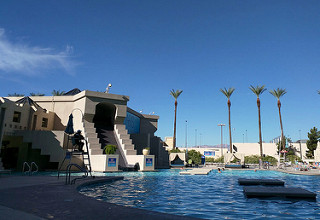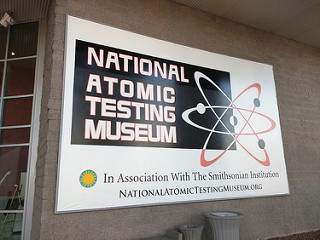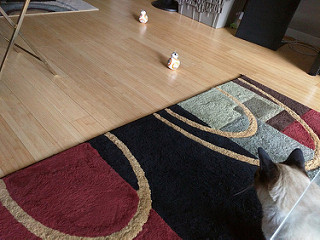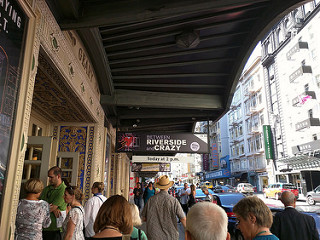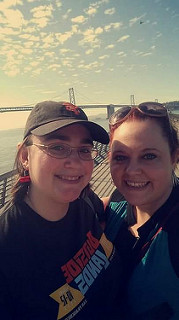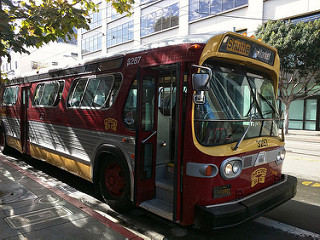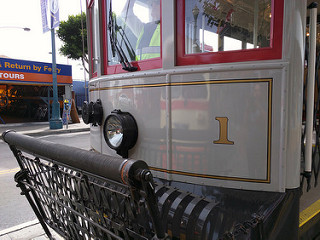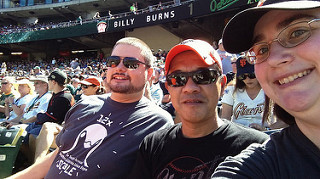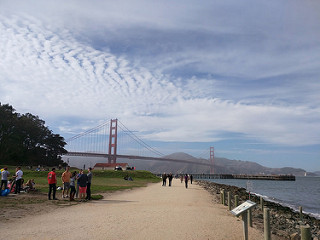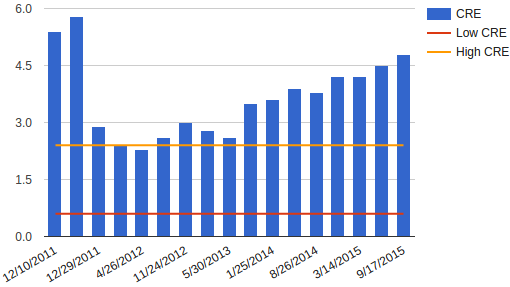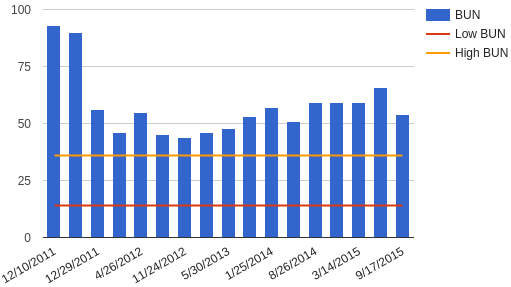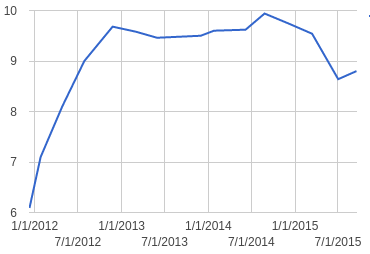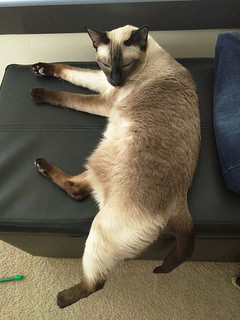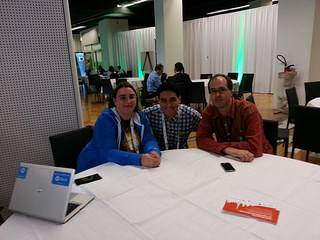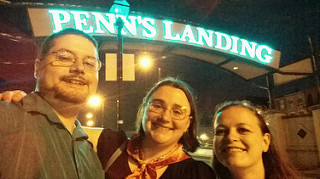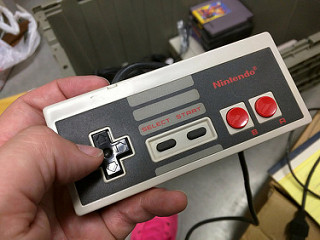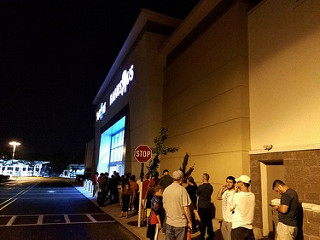For Mitaka, the OpenStack Summit is only 4 days long, lasting from Tuesday through Friday. That didn’t prevent Monday from being the kick off of festivities! I had two events Monday evening, starting with the Women of OpenStack networking event at Aoyama Laputa Garden. I was happy to be around many familiar faces who all made the evening an enjoyable one. From there, I returned to the summit venue to then walk over to the HP employee party at a nearby restaurant which rounded out my evening. Thankfully back at the hotel by 10PM, we have a long week ahead of us.
Tuesday was the actual launch of the summit. The initial stats coming out say that this summit has just over 5,000 attendees from 56 countries, which makes it the biggest non-North American summit to date. My day began by attending several keynotes (all of which are in the video here: OpenStack Tokyo Summit Full Keynote). It continues to be inspiring to watch such diverse companies embracing not only the usage of open source and OpenStack, but the contributions back to the community. It’s noteworthy that contributing back is always a highlight of many of the keynotes given by companies at this event. Jonathan Bryce also talked about the cool new feature on the OpenStack website that takes various metrics and creates a table tracking age, maturity and adoption to help operators evaluate each component, it can be found at: http://www.openstack.org/software/project-navigator. He also announced an OpenStack certification that was built and developed with some of the training partners and will start being available to take in 2016.
The keynote from Lithium Technologies talked about their use of containers in their OpenStack deployment and how they’ve allowed the company to do some really interesting scaling and high availability work. Plus, the presenter did a live demo of updating a site in production as he replaced lasers with fish in the Croc Hunter game, I guess making it Croc Feeder! The keynote from Yahoo! Japan had the most interesting statistics, sharing that they have 50k instances across their OpenStack deployment, 20 petabytes of data storage for it and over 20 OpenStack clusters. It was also interesting to hear from Erica Brescia, COO and co-founder of Bitnami, who spoke to making cloud platforms as easy to contribute to as possible, which touched upon the commoditization of cloud and how companies manage to distinguish themselves in an ecosystem that has so much choice.
After Erica’s keynote I had to run out to meet up with some of my HP colleagues for a quick interview with Stephen Spector about the work I’m doing on the Infrastructure team. I’m admittedly not one for videos or live interviews in general, but I really love talking about my work, so I hope at least that was reflected in the video (which will be posted soon).
The rest of my Summit day was consumed with translations/i18n sessions. The first was a summit presentation on Get OpenStack to speak your language – OpenStack I18n Team Introduction by Ying Chun (Daisy) Guo of IBM, Carlos Munoz of Red Hat and KATO Tomoyuki of Fujitsu. Daisy began by talking about the short history of i18n team, the current statistics of 40 language teams working on various languages, the 12 languages that fully translated Horizon for the Liberty cycle and an overview of team organization and high priority targets for translations, including Horizon and the user guides. Carlos went on to talk about Zanata and the script workflow that we’ve developed in OpenStack for syncing between git, our code review system and Zanata. He also covered pending improvements, including to glossary support, per-project permissions, statistics (including for Stackalytics), better request management for people wishing to join teams and have to be approved by translations coordinators. KATO then concluded the session by doing a demo of the OpenStack Zanata instance to demonstrate how to get started with using it and shared some best practices put in place by the Japanese team, reflecting that other teams would also have similar practices that potential translators should look into. He also mentioned the dashboard translation check site being worked on for Mitaka, which we created a spec for last cycle: Provide a translation check site for translators. Video of the presentation is available here.
I did some wandering around the Marketplace and then had lunch with my friend and colleague Steve Kowalik who I’ve most recently been doing a lot of translations infrastructure work with. Events of my afternoon continued with the session I was nominally leading on Translation Tool Support: What Do We Need to Improve? The discussion mostly centered around the experience and improvements needed for Zanata, which went live for the Liberty cycle translations in September. Aside from a few pain points, the major discussion happened around the need for statistics to be fed into Stackalytics and the barriers that exist to making that happen. We also touched upon the translation check site I mentioned earlier, and I think we now have a path forward to getting the tooling that had been used in the past for a privately hosted instance shared so we can see how to replicate it in OpenStack’s Infrastructure. Read-only Etherpad with notes from the session here.
Daisy ran the next session on Translation and Development: How Do They Work Together? where we spent a lot of time talking about how the freezing of branches and importing for the Liberty release worked and speculating as to what changes needed to be made so that the development cycle isn’t held up and the translators still have enough time to do their work. We also dove into some discussions around how the scripts currently work and preferences around handling stable branches that translators may want to go back to and update and have included in a stable release update. Read-only Etherpad with notes from the session here.
Jumping right back in with parties, this evening I attended the Core Reviewers party put on by HP. This party is usually a highlight of the summits for me, and this time was no exception. It was hosted at Sengakuji Temple which houses a small museum related to the on site cemetery of the famous Forty-seven Ronin who avenged their master’s death and then committed seppuku (ritual suicide) in lieu of other punishment. The event itself had a story of these Ronin, complete with actors who we were able to pose with:
The event had an assortment of Japanese food and drink, I went with sake and okonomiyaki, yum! Other entertainment included some live calligraphy, a short kabuki dance and various musical performances. We were also able to bring incense to the graves of the Ronin warriors to pay respects.
Off to a good start to the summit! Looking forward to the next three days.








